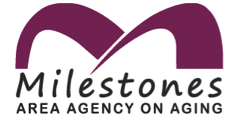March 1, 2024
Nourishing Older Bodies

By Milestones Area Agency on Aging
With March being National Nutrition Month, it’s the perfect time to reflect on the importance of healthy eating. As we age, nutritional needs evolve, impacting everything from energy levels and muscle strength to immune function and cognitive health. Proper nutrition becomes the cornerstone of well-being in later years.
First, bodies have decreased caloric needs. Metabolic rates tend to slow over time, requiring fewer calories. However, quality over quantity remains crucial, and we should focus on whole foods that are high in nutritional value and avoid empty calories from junk food and alcohol.
Muscle mass naturally declines with age, making protein vital for strength and mobility. Aim for .5 grams of protein per pound of weight each day. Lean meats, fish, beans, eggs, and dairy are excellent sources. For bone health, calcium and vitamin D are crucial for maintaining strength and preventing osteoporosis. Dairy products, leafy greens, and fortified foods can help, though supplements might be recommended by your doctor.
Fiber is one of the most important things for your heart and for proper digestive health, and fruits and vegetables are the best sources. The USDA recommends 5 servings of fruits and vegetables daily. Don’t worry, the actual serving sizes may be smaller than you realize. A serving is one cup of raw fruits or veggies, a half cup if cooked, or two cups of leafy greens. If you are unable to eat 5 servings a day, there are many fiber supplements on the market that you can discuss with your doctor or through a free nutrition consultation at Milestones.
Most of all, don’t forget to drink water! Dehydration, even mild, can affect cognitive function and energy levels. Ideally, a person should have 6-8 glasses of water daily, adjusting for individual needs.
A new saying popular in fitness blogs and magazines is that “if the food didn’t exist 100 years ago, do not eat it.” Meaning, avoid highly processed foods with extensive ingredient lists that your grandparents would not have recognized.
Here are other tips for proper nutrition:
- Choose wisely: Focus on whole foods like fruits, vegetables, whole grains, lean protein sources, and healthy fats. Limit processed foods, sugary drinks, and excessive saturated and trans fats.
- Portion control is important: Even healthy foods can contribute to weight gain if consumed in excess. Use smaller plates and practice mindful eating to avoid overconsumption.
- Read food labels: Pay attention to sodium content, particularly in processed foods. Aim for less than 2,300 milligrams of sodium daily.
- Spice up your life: Herbs and spices add flavor without extra sodium or calories, enhancing enjoyment and promoting healthy eating habits.
Remember, a healthy diet is a journey, not a destination. Embrace experimentation, explore new recipes, and prioritize whole, nutritious foods while enjoying the pleasures of good company and mindful eating. If you have other dietary questions, please contact Milestones at 855-410-6222 for a free nutrition consultation.
Milestones Iowa Area Agency on Aging promotes a variety of Wellness Programs dedicated to building healthy lifestyles for older adults through education, counseling, and a variety of fitness and wellness classes to help keep you healthy and independent. Want to Learn More? Call Milestones at (855)-410-6222 or visit milestonesaaa.org.
Filed Under: Health & Wellness, History, News
Trackback URL: https://www.50pluslife.com/2024/03/01/nourishing-older-bodies/trackback/


